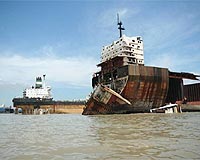| . |  |
. |
Ottawa, Canada (SPX) May 18, 2009 Lockheed Martin completed a successful System Design Review (SDR) with the Canadian Navy, marking a major milestone toward modernizing the combat systems on the Navy's 12 Halifax-class multi-mission frigates. The SDR, a government-mandated review of a contractor's progress and planning for all elements of a program, covered in detail all of Lockheed Martin's plans for shipboard systems, trainers and facilities. With the successful SDR, Lockheed Martin can begin implementing the plans, including the final selection of key components for the new combat systems for the ships. Following a rigorous source selection process, Lockheed Martin Canada has selected the major sensor and combat system elements to meet the requirements of the Navy's Halifax Class modernization effort. These include the Thales Smart-S Mk II 3-D radar; Telephonics' IFF Mode S/5 Identification Friend or Foe; Raytheon's Pathfinder Mk II navigational radar; Saab's Sea Giraffe SG-150 (HC) 2-D radar; Ceros' fire control system radar; the Elisra Electronic Support Measures suite; Frontier Electronics' radar distribution and video switching system; and IBM's Multilink (Link 11, 16 and 22) system for coordinated sharing of combat system data. "As the prime contractor for this combat system modernization effort, Lockheed Martin Canada has worked in concert with the Navy to ensure critical time-lines are met and that we continue to successfully march toward our goal of integrating the new systems into the Halifax-class frigates," said Tom Digan, President of Lockheed Martin Canada. "Lockheed Martin's selection of these components represents an important milestone, and we welcome each subcontractor to the Halifax Class Modernization team as we work to meet the Canadian Navy's demanding operational requirements." Awarded in late 2008, the Combat Systems Integration (CSI) contract is a C$1.5B program that will provide a new command and control system, radars, tactical data links, electronic support measures and other warfare capabilities for the Canadian Navy's 12 Halifax-class frigates, which were commissioned between 1992 and 1997. Under the terms of the contract, Lockheed Martin Canada also will maintain the current command and control systems until the entire fleet has received the retrofit. The CSI contract is a Government of Canada defence procurement which is subject to Canada's Industrial and Regional Benefits (IRB) Policy. The IRB policy requires Lockheed Martin Canada, as the prime contractor, to undertake high-quality business activities in Canada equal to 100% of the contract value. Lockheed Martin Canada has been the combat systems integrator for the Halifax Class for the past two decades. The company hosts the Canadian Navy's integration lab at its facility in Montreal and employs dedicated teams in Esquimalt, BC, and Halifax, NS, to maintain and upgrade the combat systems, maintenance procedure trainers, and team trainers located there. The company is the original equipment manufacturer of the combat systems for the Halifax Class and is the in-service support provider for both the Halifax and Iroquois Class vessels. Share This Article With Planet Earth
Related Links Lockheed Martin Naval Warfare in the 21st Century
 Dozens of nations sign treaty on shipbreaking
Dozens of nations sign treaty on shipbreakingHong Kong (AFP) May 15, 2009 Dozens of nations signed a new treaty Friday to make ship recycling safer, but activists called it a step backwards for the environment and the labourers who carry out the dangerous work. The UN's International Maritime Organisation (IMO) convention is the first-ever such agreement on shipbreaking, which often exposes workers to asbestos, mercury and other hazardous substances. The deal ... read more |
|
| The content herein, unless otherwise known to be public domain, are Copyright 1995-2009 - SpaceDaily. AFP and UPI Wire Stories are copyright Agence France-Presse and United Press International. ESA Portal Reports are copyright European Space Agency. All NASA sourced material is public domain. Additional copyrights may apply in whole or part to other bona fide parties. Advertising does not imply endorsement,agreement or approval of any opinions, statements or information provided by SpaceDaily on any Web page published or hosted by SpaceDaily. Privacy Statement |